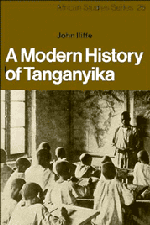Book contents
- Frontmatter
- Contents
- List of maps and tables
- Preface
- Acknowledgments
- Terminology
- Abbreviations
- Map I Tanganyika
- 1 Intentions
- 2 Tanganyika in 1800
- 3 The nineteenth century
- 4 The German conquest
- 5 Colonial economy and ecological crisis, 1890–1914
- 6 The Maji Maji rebellion, 1905–7
- 7 Religious and cultural change before 1914
- 8 Fortunes of war
- 9 The origins of rural capitalism
- 10 The creation of tribes
- 11 The crisis of colonial society, 1929–45
- 12 Townsmen and workers
- 13 The African Association, 1929–48
- 14 The new colonialism
- 15 The new politics, 1945–55
- 16 The nationalist victory, 1955–61
- Bibliography
- Index
- Frontmatter
- Contents
- List of maps and tables
- Preface
- Acknowledgments
- Terminology
- Abbreviations
- Map I Tanganyika
- 1 Intentions
- 2 Tanganyika in 1800
- 3 The nineteenth century
- 4 The German conquest
- 5 Colonial economy and ecological crisis, 1890–1914
- 6 The Maji Maji rebellion, 1905–7
- 7 Religious and cultural change before 1914
- 8 Fortunes of war
- 9 The origins of rural capitalism
- 10 The creation of tribes
- 11 The crisis of colonial society, 1929–45
- 12 Townsmen and workers
- 13 The African Association, 1929–48
- 14 The new colonialism
- 15 The new politics, 1945–55
- 16 The nationalist victory, 1955–61
- Bibliography
- Index
Summary
In pre-colonial Tanganyika each individual had belonged to several social groups: nuclear family and extended family, lineage and chiefdom, and perhaps clan and tribe. Circumstances had led some to emphasise one identity. Successful warfare had stimulated consciousness of Hehe identity, travel had taught others that strangers called them Nyamwezi, and Shambaa clans had atrophied under unified Kilindi rule. Yet groups and identities had remained so amorphous that to write of them is to oversimplify them.
The colonial period further complicated identities and loyalties. Men might now think of themselves as also being Muslims or Christians, Protestants or Catholics, clerks or workers, Africans, or even Tanganyikans. Again circumstances largely determined which identity they emphasised. Men deeply involved in colonial society formed the Tanganyika Territory African Civil Services Association, while the deprived often stressed parochial identities. But between the wars the chief emphasis was on tribal identity. Men devoted as much energy to consolidating and advancing tribes as their children would later devote to creating a nation. The subject has been little studied, but it is clear that emphasis on tribe rather than other identities resulted from socio-economic change and government policy. The policy was indirect rule. Although conservative in origin it was radical in effect because it rested on historical misunderstanding. The British wrongly believed that Tanganyikans belonged to tribes; Tanganyikans created tribes to function within the colonial framework.
- Type
- Chapter
- Information
- A Modern History of Tanganyika , pp. 318 - 341Publisher: Cambridge University PressPrint publication year: 1979
- 9
- Cited by

